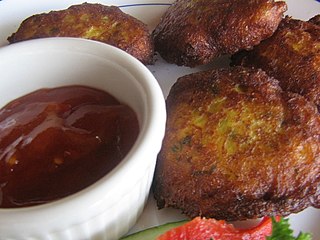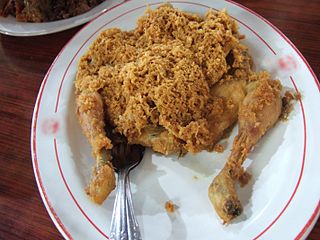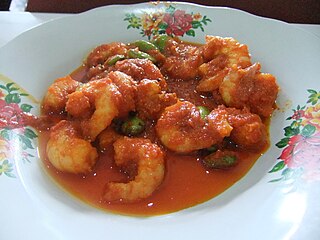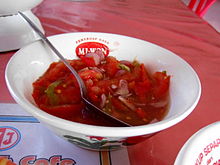
In cooking, a sauce is a liquid, cream, or semi-solid food, served on or used in preparing other foods. Most sauces are not normally consumed by themselves; they add flavor, moisture, and visual appeal to a dish. Sauce is a French word taken from the Latin salsa, meaning salted. Possibly the oldest recorded European sauce is garum, the fish sauce used by the Ancient Romans, while doubanjiang, the Chinese soy bean paste is mentioned in Rites of Zhou in the 3rd century BC.

Tempoyak, asam durian or pekasam is a Malay condiment made from fermented durian. It is usually consumed by the ethnic Malays in Maritime Southeast Asia, notably in Indonesia and Malaysia. Tempoyak is made by taking the flesh of durian and mixing it with some salt and kept in room temperature for three or five days for fermentation. Tempoyaks are usually made during the durian season, when the abundance of durian and excess production are made into fermented tempoyak.

Chili sauce and chili paste are condiments prepared with chili peppers.

Lalab or lalap/lalapan (Indonesian) is a Sundanese raw vegetable salad served with sambal terasi. It is a popular Sundanese vegetable dish that originated from West Java & Banten, Indonesia.

Bumbu is the Indonesian word for a blend of spices and for pastes and it commonly appears in the names of spice mixtures, sauces and seasoning pastes. The official Indonesian language dictionary describes bumbu as "various types of herbs and plants that have a pleasant aroma and flavour — such as ginger, turmeric, galangal, nutmeg and pepper — used to enhance the flavour of the food."

Minahasan cuisine or Manado cuisine is the cooking tradition of the Minahasan people of North Sulawesi, Indonesia. It is popularly known as "Manadonese cuisine" after Manado, the capital of the province, although other cities in Northern Sulawesi, such as Bitung, Tomohon and Tondano, are also known as Minahasan culinary hotspots. Manadonese cuisine is known for its rich variations in seafood, generous amount of spices, extra-hot condiments, exotic meats, and European-influenced cakes and pastries. Popular Manadonese dishes include tinutuan, cakalang fufu, cakalang noodle, paniki, chicken or various fish and seafood spiced in rica-rica or woku spices, chicken tuturuga, and brenebon.

Woku is an Indonesian type of bumbu found in Manado cuisine of North Sulawesi, Indonesia.

Rica-rica is a type of Southeast Asian hot and spicy bumbu found in Minahasan cuisine and Gorontalo cuisine of Minahasa Peninsula, North Sulawesi, Indonesia.

Colo-colo is an acidic condiment commonly found in Maluku archipelago, Indonesia. It is believed to have originated in Ambon city, and accordingly is often described as Ambon's sambal. Colo-colo is similar to Manado's dabu-dabu, as they both use many chopped red chili peppers, bird's eye chili, shallots, red and green tomatoes, and a pinch of salt and sugar, mixed with fresh calamansi juice or locally known as lemon cui or jeruk kesturi. The main difference is that colo-colo recipe often includes additional ingredients, such as chopped lemon basil, kenari nut, and tahi minyak or ampas minyak, or caramelized rarobang. As a result, colo-colo is darker and more oily than dabu-dabu.

Ayam goreng is an Indonesian and Malaysian dish consisting of chicken deep fried in oil. Ayam goreng literally means "fried chicken" in Malay, Indonesian and also in many Indonesian regional languages. Unlike other countries, Indonesian fried chicken usually does not use flour as its main ingredients, instead it uses turmeric and garlic as its main ingredients.

Ayam bakar is an Indonesian and Malay dish, consisting of charcoal-grilled chicken. Ayam bakar literally means "grilled chicken" in Indonesian and Malay.

Ikan goreng is a hot dish consisting of deep fried fish or other forms of seafood. Ikan goreng literally means "fried fish" in Indonesian and Malay languages.

Sambal is an Indonesian chili sauce or paste, typically made from a mixture of a variety of chilli peppers with secondary ingredients such as shrimp paste, garlic, ginger, shallot, scallion, palm sugar, and lime juice. Sambal is an Indonesian loanword of Javanese origin. It originated from the culinary traditions of Indonesia and is also an integral part of the cuisines of Singapore, Malaysia, Brunei, and Sri Lanka. It has also spread through overseas Indonesian populations to the Netherlands and Suriname.

Ikan bakar is an Indonesian and Malay dish, prepared with charcoal-grilled fish or other forms of seafood. Ikan bakar literally means "grilled fish" in Indonesian and Malay. Ikan bakar differs from other grilled fish dishes in that it often contains flavorings like bumbu, kecap manis, sambal, and is covered in a banana leaf and cooked on a charcoal fire.

Balado is a type of hot and spicy bumbu found in Minang cuisine of West Sumatra, Indonesia. It has since spread through the rest of Indonesia and also Malaysia especially in Negeri Sembilan. Balado sauce is made by stir frying ground red hot chili pepper with other spices including garlic, shallot, tomato and kaffir lime in coconut or palm oil.

Udang balado or sambal goreng udang is a hot and spicy shrimp dish commonly found in Indonesian cuisine. It is made of shrimp, either peeled or unpeeled, stir-fried in hot and spicy sambal paste in a small amount of cooking oil.

Ayam rica-rica is an Indonesian hot and spicy chicken dish. It is made up of chicken that cooked in spicy red and green chili pepper. The origin of this dish is from Minahasan cuisine of North Sulawesi.


















